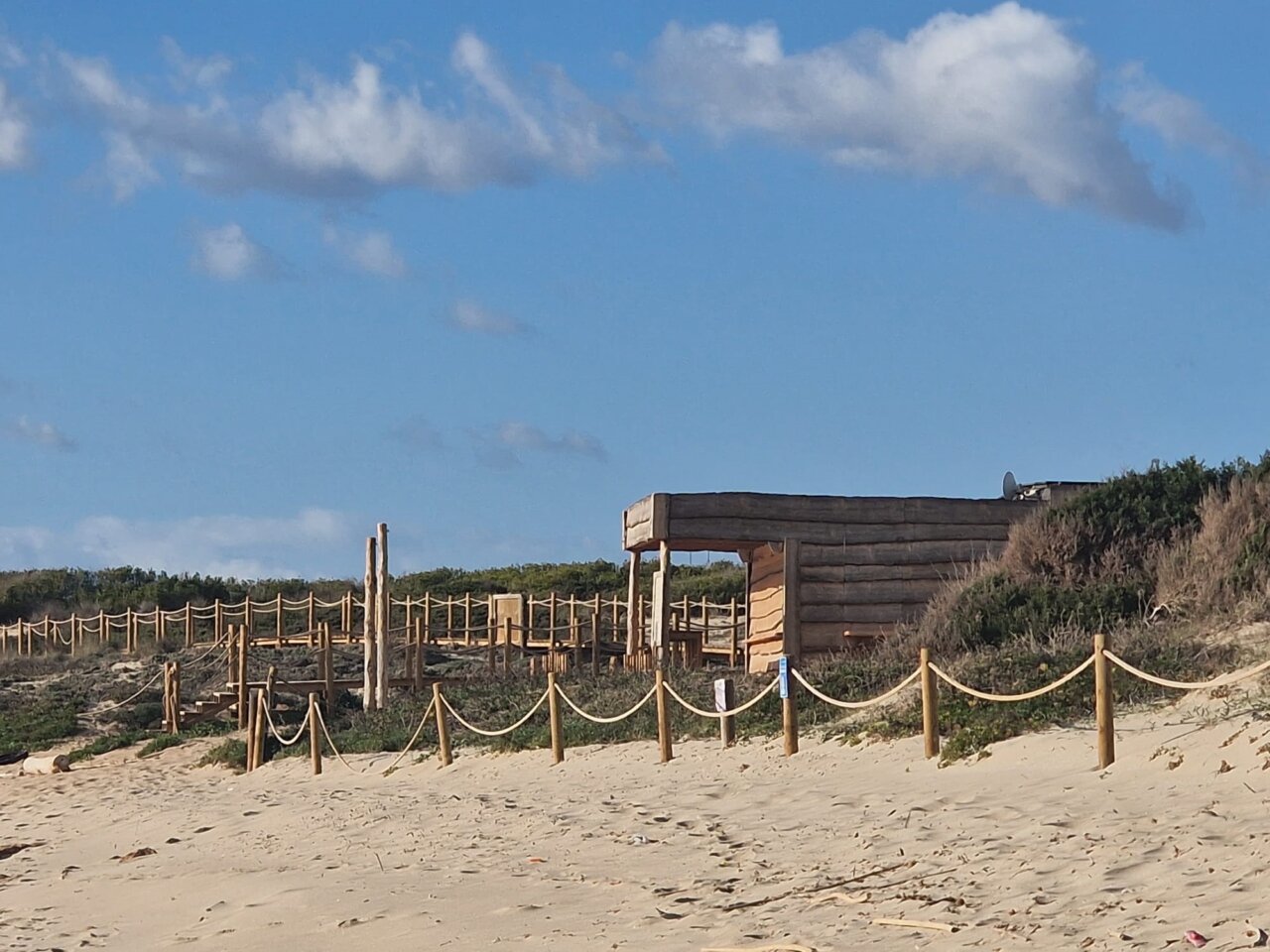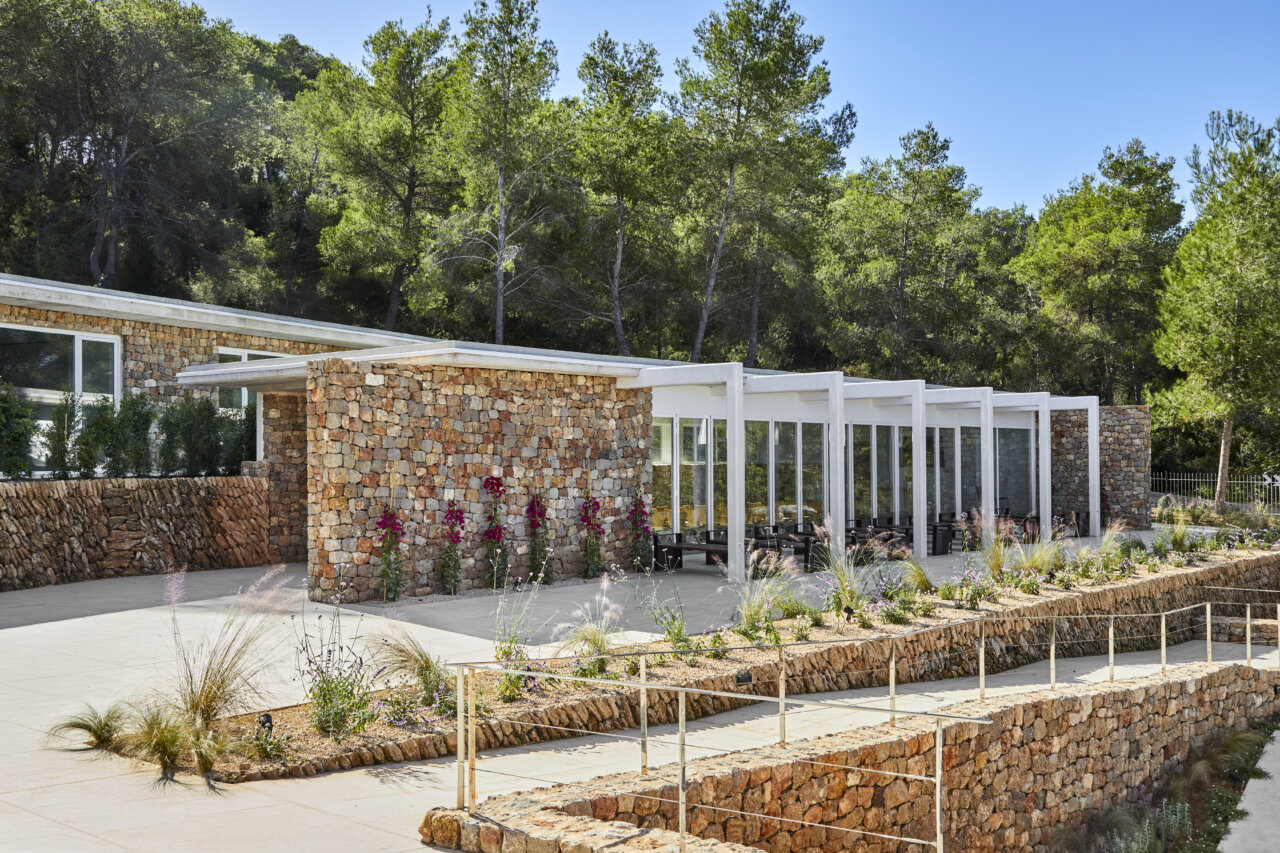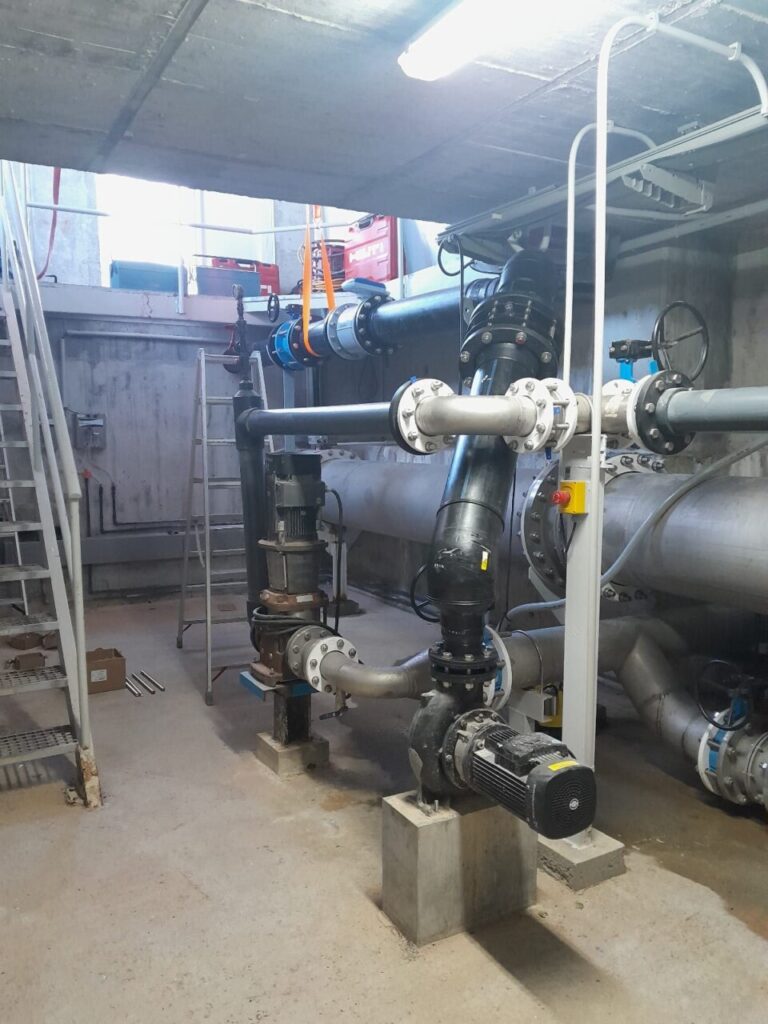The Consell de Formentera has taken as a basis the report prepared by the beach bars themselves in the form of allegation to avoid the obligation to dismantle the beach kiosks, copying the arguments put forward by the new concessionaires of the mega-concession under suspicion.
This is clear from the simple analysisof the report signed by the lawyer of 7 of the 8 beach bars, Francisco Javier Jiménez de Cisneros Cid, and the request addressed by the Consell to the Directorate General of Coasts and Coastal requesting “a precautionary measure to suspend the obligation to dismantle the beach kiosks”. On December 16 last year, the mercantile entities Mar y Playa 2 SL, Apartamentos Castavi SA, Paraíso de los Pinos SA, Delle Vittorie SL, Monolisto 2016 SL, Far Away La Mola SL and Ojala Formentera 3 SL had issued a report requesting the Consell to modify the concession granted by the Ministry for Ecological Transition and Demographic Challenge on April 26, 2023. This report was aimed at requesting the Directorate General of Coasts and Coast of the Ministry of the Sea and Water Cycle of the Balearic Government to remove the obligation to dismantle the kiosks from January 15 to February 15. Something that finally the Consell executed this Wednesday, when the deadline expired for the structures installed on the natural sections of the beaches to be dismantled, as established by the Coastal Regulation. The arguments put forward there by the insular institution to the Directorate General of Coasts and Coastal have striking similarities. All with the expiration of the deadline stipulated by the Consell itself and ratified by the legal-technical report issued last December 20 which confirms the dismantling for 30 days between January and February.
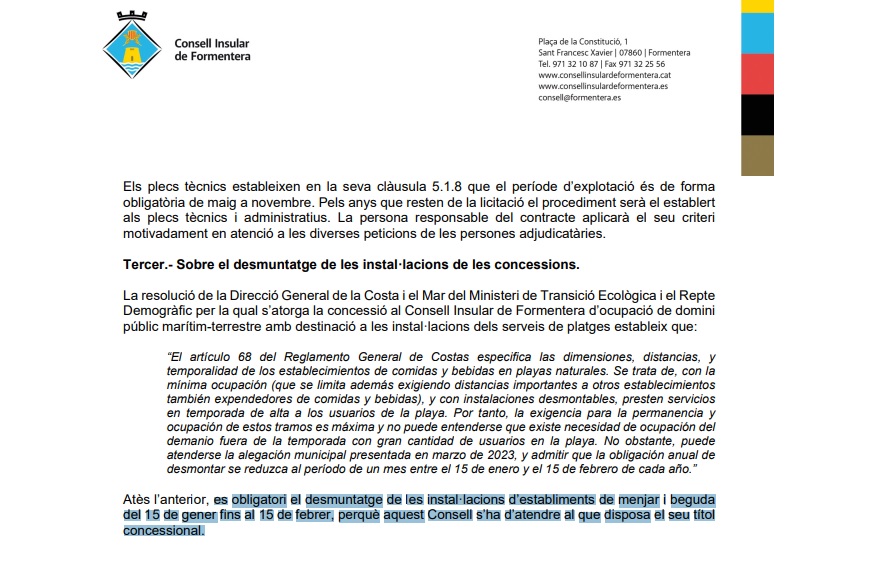
Same arguments, same lies
The Consell structures its argumentation in two fundamental axes, which are contaminated with falsehoods. Firstly, they state that “the regulation does not detail at any time the definition of season, nor does it indicate in which months a season is fixed“. On this point, the Consell de Formentera considers that “it does refer to the fact that the establishments must be dismountable, but in no case that they must be dismantled every year”. However, the General Coastal Regulation, updated in 2014, establishes not only the obligation to install non-fixed modular structures for the operation of the beach bars but also to carry out the dismantling at the end of each season. In addition, the concessionary title of Costas establishes that “the administrative concessions must be dismantled one month a year (during the first quarter of the year)“, from a municipal allegation filed in March 2023 it was established that “the annual obligation to dismantle is reduced to the period of one monthbetween January 15 and February 15 of each year“. While the technical description clarifies the “mandatory closing and dismantling period”: “All administrative concessions must be dismantled 1 month per year (during the first quarter of the year) and temporary concessions at the end of the season”.
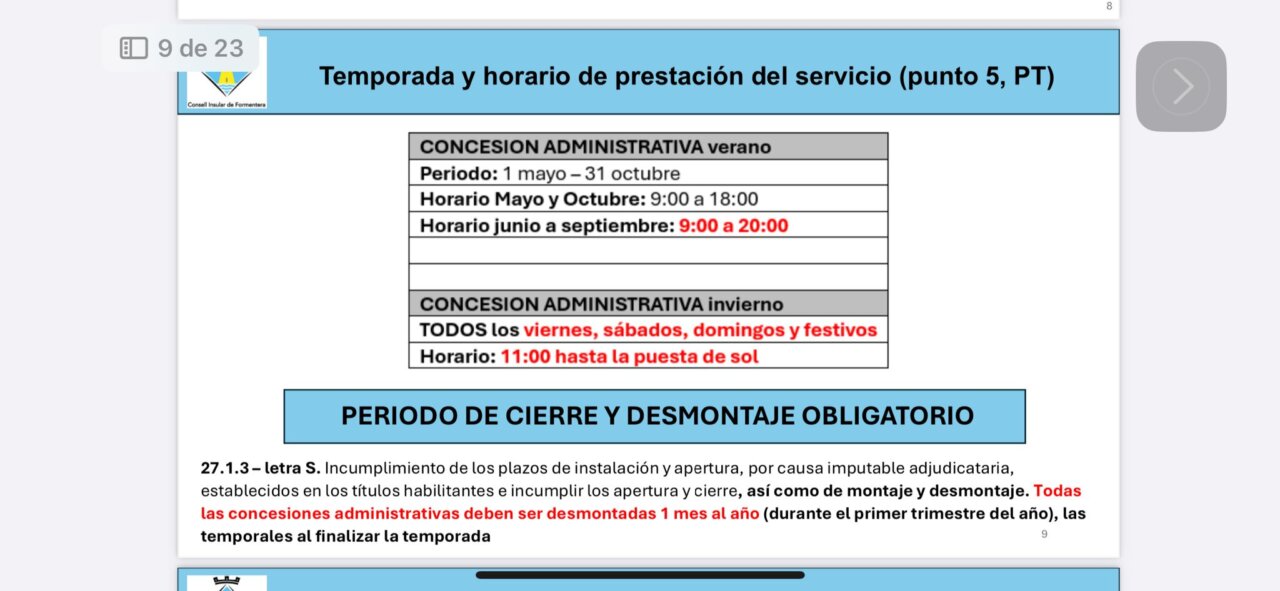
The report presented by the lawyer of the beach bars raised the same argument logic. In this sense, the concessionaires argued that “there is not a single mention of the obligation to dismantle the kiosks in the month of January; on the contrary, among the conditions and obligations of an environmental nature there is not the slightest trace or hint on this issue”.
“Legal conflict”
The concessionaires argued about an alleged “legal conflict” as a result of the “lack of consistency between the contractual specifications approved by the Consell and the content of the concession, which is explained, in turn, by the time difference between one and the other”. In a surprising interpretation, the chiringuitos differentiate two types of projects and facilities in the environmental document that assesses the impact on the environment: ” Temporary facilities that may only be exploited in the summer season and are removable each season(hammocks and umbrellas); and other fixed facilities built with easily removable elements, whose operation is planned throughout the year with the specific intention of the Consell to deseasonalize the supply and exploitation of the kiosk-bar, but which will only be dismantled at the end of the contract term or, in any case, at the end of the concession granted.” In this line, it considers the beach bars as “fixed installations”, contrary to what is established in the Coastal Regulation, which states that the kiosks in natural stretches “cannot be permanent”. The argument is based on a mere “legal dualism” which it considers “extraordinarily relevant” to understand “the different legal regime of the beach facilities: on the one hand the hammocks, umbrellas and other seasonal services, which require only authorization (arts. 113 and 114 of the General Coastal Regulation); and on the other, the fixed facilities, with easily removable elements, whose term of operation extends beyond four years, which require a concession title (art. 113.2 of the General Coastal Regulation)”. On the same point the Consell makes axis in its request to the Directorate General of Coasts and Coasts, stating that the beach bars have a “special social relevance to be a meeting point for residents and visitors”, in addition to “being a key element to promote the deseasonalization“.
“Negative effects.”
In addition to economic, security and social reasons, the Consell adds the ” environmental” issue and has informed all successful bidders that, “provisionally and until the precautionary measures are resolved, not to proceed to dismantle the kiosks-bar to avoid causing irreparable damage,” Almost the same words raises the report of the beach bars, which speaks of “negative effects on the natural environment of the annualdismantling process “, with the intervention of “technical and material means”. “We must insist on the absence of reasonableness of such a measure – which very negatively affects the balance of the contract concluded – and the triviality of its modification,” raised the chiringuitos.
Easily removable?
Although the owners characterize the installed structures as “easily dismountable”, this contradicts with the time they estimate to carry out the lifting process: 30 days. According to Juanjo Costa, responsible for the kiosk at Migjorn – who was ‘authorized’ to bury pipes under the protected dunes without a license-, in an interview to Ràdio Illa, the obligation to dismantle implies in practice to stay without beach establishments for three months: one to assemble, one to dismantle and the month without facilities. However, as La Voz de Ibiza has advanced, according to a company specialized in the installation of modal structures for beach bars, this does not take more than 2 days, at a cost of 3,000 euros for installation and 3,500 euros for dismantling, against the 50,000 euros that the concessionaires claim the operation would cost. On the other hand, the Consell speaks of dismountable structures although they clarify that this does not mean that “they are easily dismountable since they are manufactured with quality materials and have a great constructive complexity”. On this point, Article 110 of the Coastal Regulation is precise when defining “dismountable facilities“:
- At the most, they will require specific foundation works, which, in any case, will not protrude from the ground.
- Are made up of prefabricated series elements, modules, panels or similar, without on-site processing of materials or use of welding.
- They are assembled and disassembled by sequential processes, being able to be erected without demolition and being easily transportable as a whole.
Requirements that the current chiringuitos do not meet, ‘dismantling’ the false idea that Formentera’s beach kiosks are dismountable.

